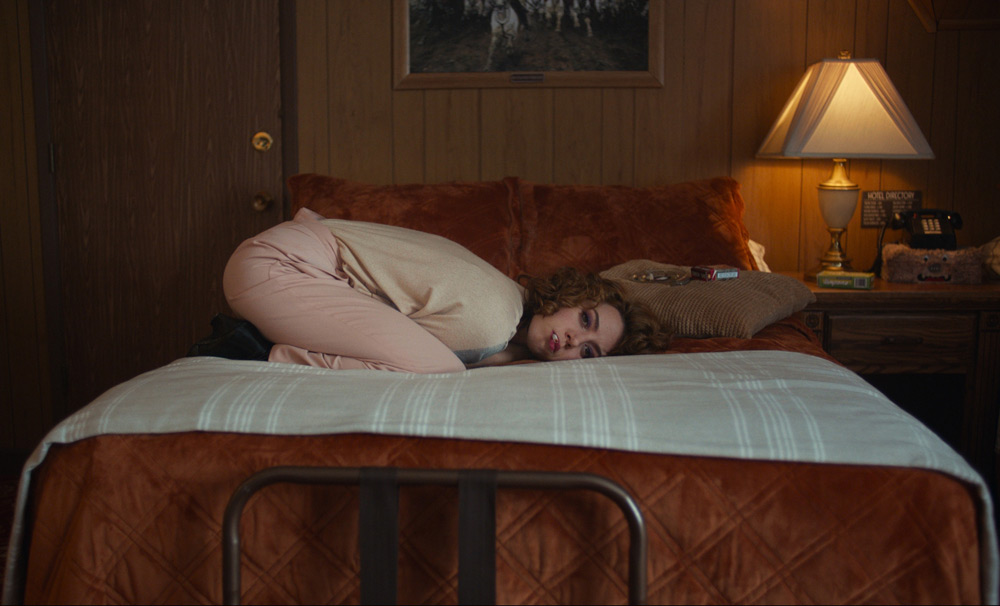“Although I don’t know quite what’s going, but I’m having a great time,” Colin (Jemaine Clement) tells Lulu (Aubrey Plaza) over a plate of cheesy onion rings in “An Evening with Beverly Luff Linn,” a refrain that might strike those familiar with writer/director Jim Hosking’s work as a statement of intent, following up the gross-out “Greasy Strangler” with a less physically nauseating, more unexpectedly touching ode to weirdoes and oddballs in search of someone who could fit them as a partner. On the surface, Colin and Lulu wouldn’t appear to be having a good time, lunching at the Morehouse Hotel in order to hide out from her husband Shane Danger (Emile Hirsch), who has stolen money from her brother Adjay (Sam Dissanayake), which is now in her possession. While the two are evading them both, Lulu has an ulterior motive in convincing Colin, who was hired by Adjay to recover the money before being flipped, to drive to Morehouse, knowing that her ex-flame Beverly Luff Linn (Craig Robinson) will be performing a magical, one-night only show there.
While Hosking and co-writer David Wike venture into the same surreal, stylized territory as Jared Hess (“Napoleon Dynamite”) with the aggression of Tim Heidecker and Eric Wareheim, “An Evening with Beverly Luff Linn” boasts a sturdier structure, initially throwing absurdist humor into a bonafide film noir plot as Shane is convinced to fire Lulu as a co-worker from his perch as manager of a burger joint when corporate cost-cutting sets in, leaving Lulu to mention her brother’s cashbox as a way to earn some extra scratch. Aware of her brother’s panic attacks that will prevent him from following her (because he drank too much breast milk as a child, of course), she only needs to double-cross Shane in order to make a getaway, finding a convenient dupe in Colin to help her. Yet once at the hotel, the femme fatale has her hands full with too many options, as Colin tries to turn their relationship romantic and she pines for Luff Linn, who now only communicates in grunts and grumbles outside of his performances for reasons that are eventually revealed as the film wears on.
Silly to the bone, the strong narrative throughline keeps “An Evening with Beverly Luff Linn” on track while Hosking and Wike are emboldened to take the characters in wilder and wilder directions, with a cast game for anything. Plaza couldn’t be better as Lulu, tempering her performance to feign enough interest in the dimwits around her to manipulate them, but bringing a genuine sense of longing to the role that could easily be one note. Likewise, Clement, Hirsch, Robinson and Jacob Wysocki, playing the long-haired concierge at Morehouse, take buffoonery to the point where it becomes genius, as characters that appear as caricatures at first gradually are revealed in their peculiarities to be quite human, whether it’s their jealousy, anger or disappointment that drives them to act so irrationally. The considerable risks taken by the actors are impressively absorbed into Hosking’s complete vision of a cohesive world for them to go nuts in, as the director surrounds them with a versatile score from Andrew Hung that ranges from spreading Tangerine Dream-esque dread into the hotel to playful, idiosyncratic interludes that mirror the low level hoods’ mischievous machinations and cinematographer Nanu Segal’s sophisticated camerawork that makes the misfits feel as if they’re able to make something whole. Even though “An Evening with Beverly Luff Linn” is filled with disappointments for its characters, the tragicomedy they help create certainly isn’t one itself.
“An Evening With Beverly Luff Linn” does not yet have U.S. distribution.




